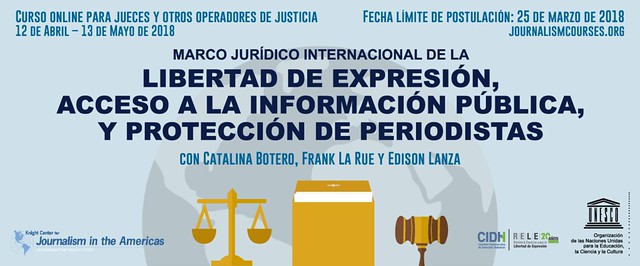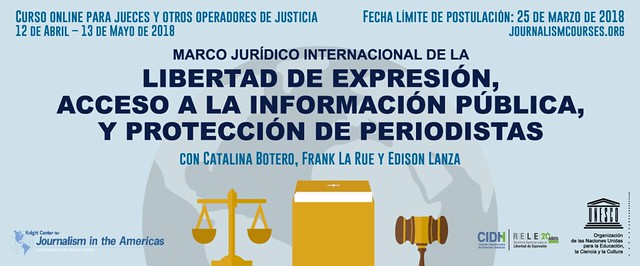
Applications are now open for the latest edition of the online course “International Legal Framework of Freedom of Expression, Access to Public Information and Protection of Journalists” which has trained more than 5,200 judges and judicial operators in Latin America and Spain in recent years.
The sixth edition of the course in Spanish will be taught between April 2 and May 13, 2018, but applications are now open.
These innovative courses for judges are an initiative of the United Nations Educational, Scientific and Cultural Organization (Unesco) and the Special Rapporteur for Freedom of Expression of the Inter-American Commission on Human Rights (IACHR), in collaboration with the Knight Center for Journalism in the Americas at the University of Texas at Austin.

It has been so successful that the Ibero-American Judicial Summit declared it “of interest” and urged the organizing parties to offer more editions of the training. The last edition of the course reached a record enrollment of 2,200 people.
The objective of this program is for more judicial operators in the region, especially judges, to strengthen their knowledge of international standards that govern the right to freedom of expression, access to public information and the protection of journalists.
Applications will be open until March 25, 2018. The application process consists of the following steps:
It is important that the email sent in the application form (point 1) is the same one that you use to create the account in our platform (point 3). This email must also be one that you have access to daily.
The introductory module of the course is open for immediate access to applicants who are accepted to participate in the course. Once you enter the introductory module, it is important to read the basic materials found there. The six modules of the course will be opened weekly starting on April 2, 2018.
As in the previous edition, the instructors are Catalina Botero, former Special Rapporteur for Freedom of Expression of the IACHR and dean of the Faculty of Law of the University of Los Andes (Colombia); Frank La Rue, Deputy Director-General of Unesco for Communication and Information and former Special Rapporteur on the promotion and protection of the right to freedom of opinion and expression of the UN, and Edison Lanza, Special Rapporteur for Freedom of Expression of the IACHR.
The course will be held from April 2 to May 13, 2018. Each weekly module consists of video classes, reading materials, quizzes, discussion forums and other assigned activities.
It is an asynchronous course, meaning there are no live activities. In this way, classes and other activities can be carried out at the student’s pace, on the days and times of each week that best suit them.
Students who successfully complete course assignments, including quizzes, may download a certificate of completion, which does not have any type of academic credit, but which documents successful participation in this online program.
“We are very happy at the Knight Center to once again be able to use our digital platform to help train judges and other judicial operators in Ibero-America on issues of freedom of expression, protection of journalists and access to public information,” said Professor Rosental Alves, director of the Knight Center for Journalism in the Americas, University of Texas at Austin.
“This series of online courses has been an example for the world of how the internet can be used to disseminate knowledge effectively and economically through the formation of learning communities that bring together so many participants from so many countries and regions. For us at the Knight Center, it is an honor to participate in this successful project. ”
The course has the support of the Ibero-American Network of Judicial Schools, the Foundation for Press Freedom, the Latin American Internet Association, the School of Government of the OAS and the Government of Sweden.
Unesco and the Office of the Special Rapporteur, in collaboration with the Knight Center, offered a pilot version of this course aimed exclusively at Mexican judicial operators in November 2014. In September 2015, a similar course designed exclusively for judicial operators and journalists from the state of Coahuila in Mexico was offered. This was the first course of its kind in the world to be directed at the state level. At the end of 2015, an edition was offered at the Latin American level, followed by the 2016 and 2017 editions during the first semesters of each year.
In total, more than 5,200 judges and other justice operators, such as prosecutors and court officials from all Latin American countries (except Cuba) participated in the five previous editions of these courses.